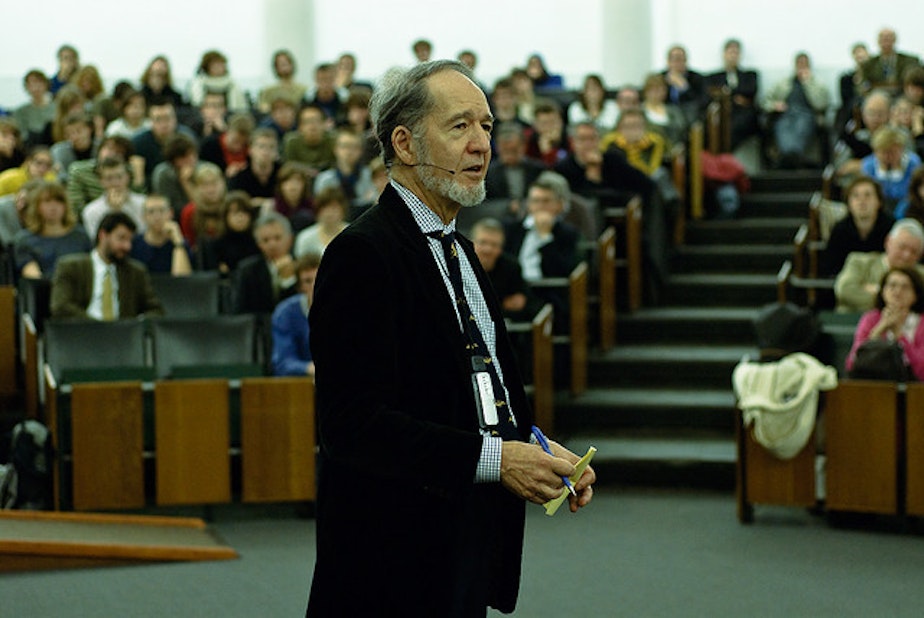Jared Diamond: Learning From Traditional Societies

Pulitzer Prize-winning author Jared Diamond joins Ross Reynolds in front of a live studio audience. For decades he has studied Papua New Guinea cultures. He writes about what we can learn from traditional social organizations in his new book "The World Until Yesterday." Below are highlights from the interview.
Yesterday’s Societies
When Jared Diamond writes “yesterday,” he means it by a standard of 6 million years — how long humans have been around. State government, on this time scale, really did only arise yesterday. Before state government and modern technology, we lived in traditional societies, which range in populations from a few dozen to a few hundred, but have no centralized government or king. Within traditional societies, there are no strangers, but tribes are constantly in warfare with their enemies.
Once a traditional society encounters the outside world, as what happened in New Guinea when Europeans arrived, society immediately starts to change. They acquire steel, matches and a colonial government — one that tells them to stop fighting.
“Every state government wants some of the same things,” says Diamond. “Every state government wants its citizens to be peaceful and not kill each other. Every state government wants its children to be raised to be loyal citizens and soldiers. Every state government wants its citizens not to get into fights. For example, [Ross] you and I had never seen each other until half an hour ago, and in this half hour, I’ve not made a move to kill you and you’ve not made a move to kill me. In New Guinea, this would be unthinkable.”
Sponsored
Diamond recalls his friend’s experience, a missionary pilot in a remote tribe in New Guinea, who attended a gathering of clans that happens once a year: “He said this occasion was absolutely terrifying. Here would come this strange person who you heard of, or that you saw once a year, and there was the person who killed your uncle, or there was the person who had abducted your sister’s cross-cousin. Every now and then someone would grab an axe and rush at someone else to kill them and had to be restrained by other people.”
Diamond says when learning about traditional societies, we shouldn’t romanticize or despise them. “There are things they do to which we say, Thank God [we left that behind.]” But modern societies have adopted some traditional culture. We talk to each other about our backgrounds and try to make connections in our pasts. However, in New Guinea, after spending a couple hours running through names of relatives with a stranger, if no connection arises, Diamond advises, “One of you better run away.”
The Good: What We Can Learn
Traditional societies tend to be less lonely — people are surrounded by friends and relatives who aren’t plugged into a screen seven hours a day. People are constantly talking to each other about anything, offering a running commentary about what they did that day, even down to the smallest detail such as the amount of potatoes one man ate.
Traditional, sedentary societies also take better care of their elders. Diamond knows this subject intimately. “My 75th birthday was some months ago ... I’m at the peak of my life! The reality is anyone with older parents or grandparents knows that old age is a disaster area of American life.” Older Americans tend to be lonely, they are undervalued and have difficulty getting jobs. Medical care is also prioritized for younger patients.
Sponsored
Traditional societies generally offer a better life for the elderly; they are more valued for being repositories of information and they are the best at making tools. In modern societies, older people may lack the skills younger people have acquired. “I grew up in 1948 with the first television set. There were three dials, I could manage those three knobs,” Diamond says. “Now to turn on the TV set in my house, there’s this wretched 41-button remote. I have to call my sons and have them talk me through it every time. That’s an example of my knowledge being out of date.”
On the other hand, older people have gone through experiences younger people have not: world wars, financial crises of the 70s and 80s and the Great Depression. “Because we’ve got experience of that, we have perspective that whiz kids don’t.”
To Adopt Or Not Adopt
Sometimes we don’t have a choice; there are some values we can’t adopt in modern society. “For example, if all houses on the block have TV and if you believe children should not have passive entertainment, and you don’t have TV for your kids, your kids are going to spend the time in houses with TV," Diamond says. "It’s difficult to do some things that run counter to trends of society.”
Diamond says, regardless of what our neighbors do, we can pay attention to the observed advantages of traditional cultures, such as not spanking kids or carrying infants upright and facing out. Then there are some things only the central government can do, such as settle more disputes outside of the court.
Sponsored
Read more about dispute resolution in NPR’s interview with Diamond.
This interview originally aired January 3, 2013.
Produced for the Web by Jenna Montgomery.

